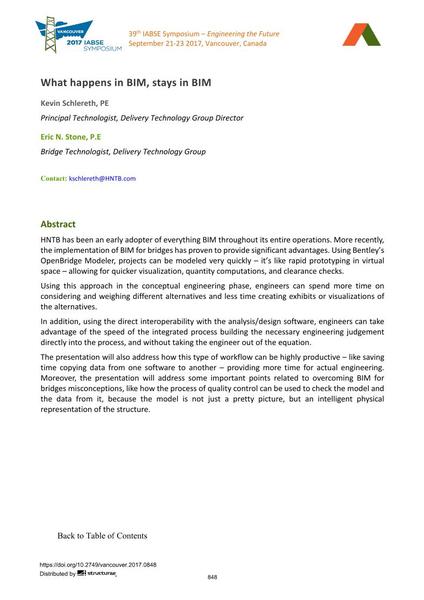
| Author(s): |
Kevin Schlereth
(Principal Technologist, Delivery Technology Group Director)
Eric N. Stone (Bridge Technologist, Delivery Technology Group) |
|---|---|
| Medium: | conference paper |
| Language(s): | English |
| Conference: | IABSE Symposium: Engineering the Future, Vancouver, Canada, 21-23 September 2017 |
| Published in: | IABSE Symposium Vancouver 2017 |
| Page(s): | 848 |
| Year: | 2017 |
| DOI: | 10.2749/vancouver.2017.0848 |
| Abstract: |
HNTB has been an early adopter of everything BIM throughout its entire operations. More recently, the implementation of BIM for bridges has proven to provide significant advantages. Using Bentley’s OpenBridge Modeler, projects can be modeled very quickly – it’s like rapid prototyping in virtual space – allowing for quicker visualization, quantity computations, and clearance checks. Using this approach in the conceptual engineering phase, engineers can spend more time on considering and weighing different alternatives and less time creating exhibits or visualizations of the alternatives. In addition, using the direct interoperability with the analysis/design software, engineers can take advantage of the speed of the integrated process building the necessary engineering judgement directly into the process, and without taking the engineer out of the equation. The presentation will also address how this type of workflow can be highly productive – like saving time copying data from one software to another – providing more time for actual engineering. Moreover, the presentation will address some important points related to overcoming BIM for bridges misconceptions, like how the process of quality control can be used to check the model and the data from it, because the model is not just a pretty picture, but an intelligent physical representation of the structure. |
0.18 MB
- About this
data sheet - Reference-ID
10298714 - Published on:
02/02/2019 - Last updated on:
21/05/2021



